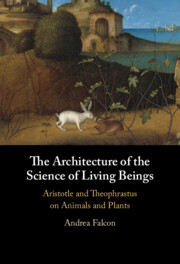441 results
Introduction
-
- Book:
- Democracy, Theatre and Performance
- Published online:
- 17 May 2024
- Print publication:
- 27 June 2024, pp 1-18
-
- Chapter
- Export citation
Chapter 13 - Plutarch and the History of Greek Poetry
- from Part III - Narratives of Change
-
-
- Book:
- Writing Literary History in the Greek and Roman World
- Print publication:
- 27 June 2024, pp 282-302
-
- Chapter
- Export citation
Chapter 10 - Aristotelian Teleology in Literary Criticism
- from Part III - Narratives of Change
-
-
- Book:
- Writing Literary History in the Greek and Roman World
- Print publication:
- 27 June 2024, pp 213-236
-
- Chapter
- Export citation
Conclusion
-
- Book:
- Deification in Classical Greek Philosophy and the Bible
- Print publication:
- 27 June 2024, pp 305-337
-
- Chapter
- Export citation
Chapter 5 - Developmental Deification in Aristotle
-
- Book:
- Deification in Classical Greek Philosophy and the Bible
- Print publication:
- 27 June 2024, pp 213-266
-
- Chapter
- Export citation
1 - Introduction
-
- Book:
- Helping Friends and Harming Enemies
- Print publication:
- 13 June 2024, pp 1-25
-
- Chapter
- Export citation
2 - Helping friends and harming enemies
-
- Book:
- Helping Friends and Harming Enemies
- Print publication:
- 13 June 2024, pp 26-59
-
- Chapter
- Export citation
Introduction
-
- Book:
- The Architecture of the Science of Living Beings
- Published online:
- 30 May 2024
- Print publication:
- 06 June 2024, pp 1-14
-
- Chapter
-
- You have access
- Open access
- HTML
- Export citation
Chapter 2 - Pythagoreans; or, Vegetarians before ‘Vegetarianism’
-
- Book:
- Vegetarianism and Veganism in Literature from the Ancients to the Twenty-First Century
- Published online:
- 30 May 2024
- Print publication:
- 06 June 2024, pp 20-63
-
- Chapter
- Export citation
Myth 17 - That Darwin’s Success Depended on Undermining “Aristotelian Essentialism”
-
-
- Book:
- Darwin Mythology
- Published online:
- 30 May 2024
- Print publication:
- 06 June 2024, pp 193-203
-
- Chapter
- Export citation
Chapter 3 - Pre-explanatory and Explanatory Strategies in Aristotle’s Study of Animals
-
- Book:
- The Architecture of the Science of Living Beings
- Published online:
- 30 May 2024
- Print publication:
- 06 June 2024, pp 77-120
-
- Chapter
-
- You have access
- Open access
- HTML
- Export citation
Chapter 1 - Aristotle’s De anima and the Study of Perishable Living Beings
-
- Book:
- The Architecture of the Science of Living Beings
- Published online:
- 30 May 2024
- Print publication:
- 06 June 2024, pp 15-45
-
- Chapter
-
- You have access
- Open access
- HTML
- Export citation
Chapter 2 - Aristotle’s Parva naturalia and the Study of Animals and Everything That Has Life
-
- Book:
- The Architecture of the Science of Living Beings
- Published online:
- 30 May 2024
- Print publication:
- 06 June 2024, pp 46-76
-
- Chapter
-
- You have access
- Open access
- HTML
- Export citation
Chapter 2 - Ancient Readers of the Gorgias
-
-
- Book:
- Plato's Gorgias
- Published online:
- 25 May 2024
- Print publication:
- 30 May 2024, pp 27-47
-
- Chapter
- Export citation
Chapter 9 - A Consolation through Philosophical Insight?
-
-
- Book:
- Boethius’ ‘Consolation of Philosophy’
- Published online:
- 23 May 2024
- Print publication:
- 30 May 2024, pp 153-168
-
- Chapter
- Export citation
10 - Property
-
-
- Book:
- The Cambridge Comparative History of Ancient Law
- Published online:
- 09 May 2024
- Print publication:
- 30 May 2024, pp 512-564
-
- Chapter
- Export citation

The Architecture of the Science of Living Beings
- Aristotle and Theophrastus on Animals and Plants
-
- Published online:
- 30 May 2024
- Print publication:
- 06 June 2024
-
- Book
-
- You have access
- Open access
- Export citation
Marx on Leisure: An Aristotelian Interpretation
-
- Journal:
- Canadian Journal of Political Science/Revue canadienne de science politique , First View
- Published online by Cambridge University Press:
- 13 May 2024, pp. 1-19
-
- Article
-
- You have access
- Open access
- HTML
- Export citation
Chapter 8 - Aristotle on the Stages of Cognitive Development
-
-
- Book:
- Conceptualising Concepts in Greek Philosophy
- Published online:
- 25 April 2024
- Print publication:
- 02 May 2024, pp 178-202
-
- Chapter
- Export citation
Chapter 4 - Are Platonic Forms Concepts?
-
-
- Book:
- Conceptualising Concepts in Greek Philosophy
- Published online:
- 25 April 2024
- Print publication:
- 02 May 2024, pp 74-95
-
- Chapter
- Export citation



